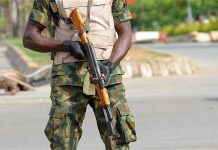A U.S.-based Nigerian and political analyst, Mr Gbenga Omotayo says the Russo-Ukraine conflict will have dire consequences for Nigeria because of the population of Nigerians working and schooling in Ukraine.
Omotayo in New York said that the crisis has serious implications for Africa because of its relations with the two countries.
“The implication will be dire; it will be dire for Nigeria and Africa because a lot of citizens are students in Ukraine.
“I am aware too that a Nigerian owns the biggest Church in Ukraine, and that the President attends so you will find a lot of Nigerian population in the country,’’ he said.
Omotayo, Chairman, Nigerian Americans Public Affairs Committee (NAPAC), New York said that in terms of trade, Russia is charting a course with Africa.
“Russia is charting a course with Africa, based on its antecedent, it seems to be doing good by us in Africa.
“However, it holds annual International trade forum for Africa leaders.
“The implication is that if they go to war, that relationship is going to be affected.
“The event will not hold because none of the leaders will want to go to Russia,’’ he said.
The political action committee leader, however, the crisis might lead to lots of problems if not managed properly, noting that it might lead to dysfunctional families.
He said the problem might lead to people being displaced and separated, and in many cases even losing their lives.
“A lot of Nigerian citizens residing in Ukraine are working and helping their people back at home.
“Economically, it is going to affect Nigeria and Africa as well because of trade relations with the two countries,’’ he added.
Omotayo said the crisis would not only affect Nigeria and Africa but the entire world.
“We know the two countries are Super Powers and NATO, which is being led by the U.S. has Super Powers as its members.
“In respect of the cause of this conflict, nobody goes to war and comes out the same.
“You can see what has happened in some countries ravaged by war in Africa and even in Iraq.
“Many times, war is not always the solution,’’’ he said.
On Feb. 21, Russia officially recognised the two breakaway regions of Donetsk and Luhansk in eastern Ukraine as independent states.
With the recognition, Russia swiftly deployed troops to Donbas, in a move interpreted as Russia’s breach of the Minsk Protocol.
The breakaway republics were recognised in the boundaries of their respective Ukrainian oblasts, which extend far beyond the line of contact.
On Feb. 22, Putin said that the Minsk agreements were no longer valid and the same day, the Federation Council unanimously authorised the use of military force in the territories.
Putin, on Feb. 24, announced that Russia was initiating a “special military operation” in the Donbas, and launched a full-scale invasion into Ukraine




